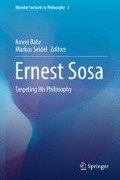Abstract
Contemporary debates about mechanisms in the philosophy of science raise the question about the relation between constitutive and causal relations. These discussions so far have not received Ernest Sosa’s “Varieties of Causation” (1980), which addresses similar questions from a metaphysical point of view. The present paper reconstructs and evaluates Sosa’s arguments from the perspective of the contemporary debates. We argue that while Sosa’s arguments are probably not suited to advance the current debate, his claim that there are different varieties of causation might be an interesting idea to consider for those who assume that there are interlevel causal relations.
Access this chapter
Tax calculation will be finalised at checkout
Purchases are for personal use only
Notes
- 1.
However, though a plethora of theories has been proposed, the current status seems to be that no convincing reductions are available (cf. Paul and Hall 2013).
- 2.
- 3.
However, the article has been cited in other contexts, both for its merit to explicitly treat cases of causal generation (i.e. cases where the effect is the existence of an object [e.g. cited by Schnieder 2006]), as well as for its uncommon claim that constitutive relations have to be considered causal (e.g. cited by Pettit 1993).
- 4.
In another work, Craver even claims that part and whole are logically dependent: “[I]n the constitutive relation, a token instance of the property Ψ is, in part, constituted by an instance of the property Φ; as such, the tokening of Φ is not logically independent of the tokening of Ψ” (Craver 2007, 153).
- 5.
Craver and Bechtel (2007) also note that assuming actions to be instantaneous might lead to contradictory causal loops.
- 6.
Constitutive relations are usually considered to be asymmetric: parts constitute their wholes but not vice versa. The existence of a table depends on the existence of a board and of a stump (the parts of the table) and their proper arrangement, whereas the existence of the stump or of the board does not depend on the existence of the table.
- 7.
Baumgartner and Gebharter (2015) deny that one can intervene on a whole in such a way without manipulating the parts. They argue that an intervention on a whole always has a fat hand, i.e. it not only changes the whole but also at least one of the parts. On this view, the thesis of mutual manipulability loses its meaning since the top-down direction of manipulation is not sufficiently surgical. Hence, according to this view, constitutive relations also entail an asymmetry in the behaviour under interventions.
References
Aristotle. 1999. Physics, ed. Robin Waterfield. Oxford: Oxford University Press.
Baumgartner, Michael, and Alexander Gebharter. 2015. Constitutive relevance, mutual manipulability, and fat-handedness. British Journal for the Philosophy of Science. doi:10.1093/bjps/axv003.
Cartwright, Nancy. 2004. Causation: One word, many things. Philosophy of Science 71: 805–819.
Craver, Carl F. 2007. Explaining the brain: Mechanisms and the mosaic unity of neuroscience. Oxford: Clarendon.
Craver, Carl F., and William Bechtel. 2007. Top-down causation without top-down causes. Biology and Philosophy 22: 547–563.
Leuridan, Bert. 2012. Three problems for the mutual manipulability account of constitutive relevance in mechanisms. British Journal for the Philosophy of Science 63: 399–427.
Paul, Laurie A., and Ned Hall. 2013. Causation: A user’s guide. Oxford: Oxford University Press.
Pettit, Philip. 1993. The common mind: An essay on psychology, society, and politics. New York: Oxford University Press.
Reiss, Julian. 2011. Third time’s a charm: Causation, science and Wittgensteinian pluralism. In Causality in the sciences, ed. Phyllis Illari, Federica Russo, and John Williamson, 907–927. Oxford: Oxford University Press.
Schnieder, Benjamin S. 2006. A certain kind of trinity: Dependence, substance, explanation. Philosophical Studies 129: 393–419.
Sosa, Ernest. 1980. Varieties of causation. Grazer Philosophische Studien 11: 93–103. Reprinted in Sosa and Tooley (1993), 234–242.
Sosa, Ernest, and Michael Tooley (eds.). 1993. Causation. Oxford: Oxford University Press.
Woodward, James. 2003. Making things happen: A theory of causal explanation. Oxford: Oxford University Press.
Author information
Authors and Affiliations
Corresponding author
Editor information
Editors and Affiliations
Rights and permissions
Copyright information
© 2016 Springer International Publishing Switzerland
About this chapter
Cite this chapter
Leonhard, G., Näger, P.M., Schäfers, A. (2016). Causation, Constitution, and Existence. In: Bahr, A., Seidel, M. (eds) Ernest Sosa. Münster Lectures in Philosophy. Springer, Cham. https://doi.org/10.1007/978-3-319-32519-4_6
Download citation
DOI: https://doi.org/10.1007/978-3-319-32519-4_6
Published:
Publisher Name: Springer, Cham
Print ISBN: 978-3-319-32517-0
Online ISBN: 978-3-319-32519-4
eBook Packages: Religion and PhilosophyPhilosophy and Religion (R0)

